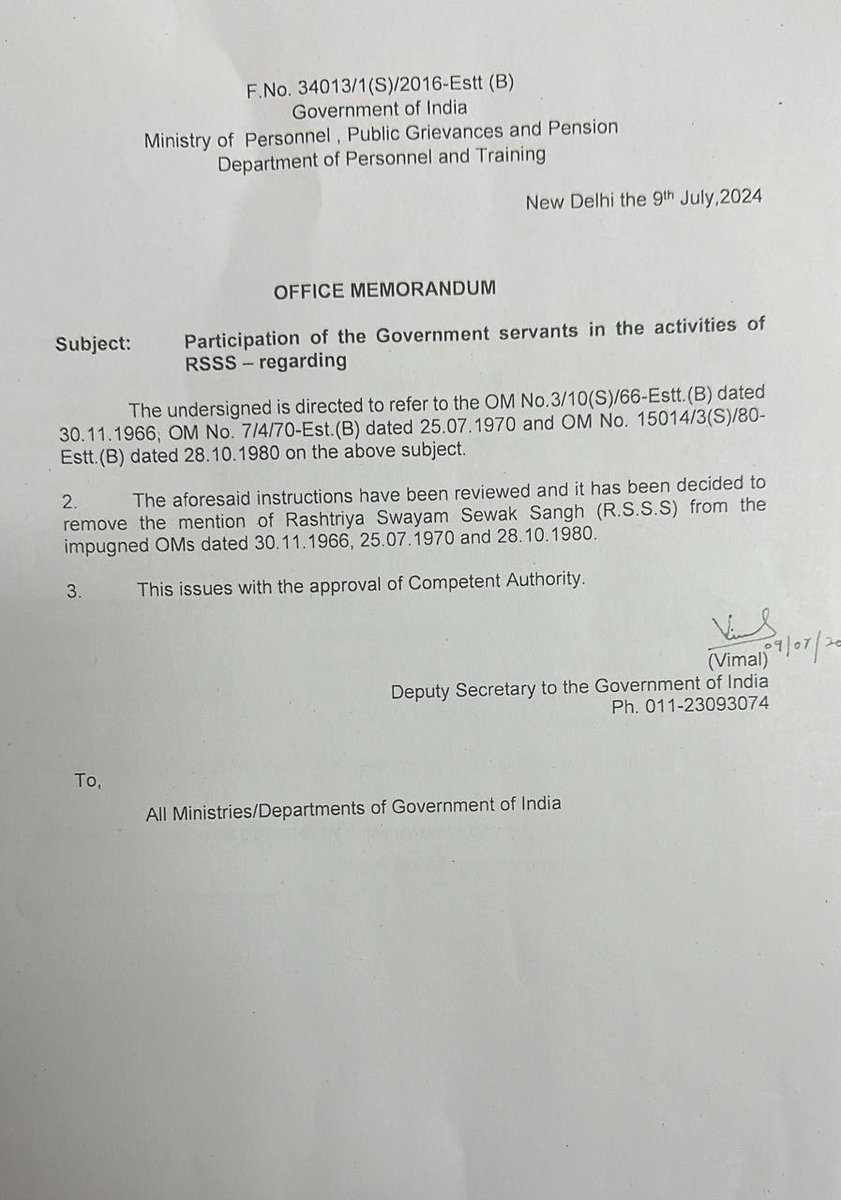Government lifts ban on civil servants joining Hindu extremist organisation
The government led by Prime Minister Narendra Modi has revoked a rule in place since 1966 that prevented civil servants from being members of the RSS, a paramilitary group that promotes the Hindutva ideology. Originally, the ban also prevented membership in the Jamaat-e-Islami, an Islamist organisation, but the latter is not mentioned in the ban revocation. INC members speak out against the government’s decision.
New Delhi (AsiaNews) – The Indian government has lifted the ban on civil servants joining the Rashtriya Swayamsevak Sangh (RSS), a far-right paramilitary organisation inspired by Hindutva, the ideology of Hindu supremacism, which promotes intolerance towards religious minorities in India.
The RSS, which is linked to Prime Minister Narendra Modi’s ruling Bharatiya Janata Party (BJP), has been banned three times since India became an independent country because of its violent rhetoric.
Two members of the opposition Indian National Congress (INC), Jairam Ramesh and Pawan Khera, shared on social media an office memorandum regarding the “participation of the government servants in the activities of RSS.”
The document, dated 9 July, was issued by the Department of Personnel and Training (part of the Ministry of Personnel, Public Grievances and Pensions). It makes explicit reference to earlier provisions, issued in 1966, 1970 and 1980, banning officials from participating in the activities of the RSS and the Jamaat-e-Islami, an Islamist organisation inspired by the Muslim Brotherhood.
Specifically, the 1966 office memorandum, drafted by the government of then Prime Minister Indira Gandhi, stated: “Any government servant, who is a member of or is otherwise associated with the aforesaid organisations or with their activities is liable to disciplinary action.”
However, the latest memorandum does not mention the Islamic organisation, only the RSS. “The aforesaid instructions were reviewed and it was decided to remove the mention of Rashtriya Swayam Sewak Sangh (R.S.S.S),” reads the document, which was not available on the department's website as of yesterday.
Sunil Ambekar, head of communications at the RSS, yesterday praised the government's initiative.
“Due to its political interests, the government at the time had baselessly banned the government employees from participating in the activities of a constructive organisation like the Sangh,” Ambekar said in a social media post.
“The present decision of the government is appropriate and strengthens the democratic system of India,” he added.
Some BJP leaders have made similar statements, arguing that the ban imposed 58 years ago was unconstitutional.
INC leader Jairam Rashem explained that RSS was banned in 1948 because of the assassination of the Mahatma Gandhi.
"Subsequently, the ban was withdrawn on assurances of good behaviour,” he said. “Even after this the RSS never flew the Tiranga in Nagpur,” where the group is headquartered. Nevertheless, for Ramesh, the 1966 ban was imposed, and “rightly so”.
After the last Union elections (April-June 2024) that saw a reduced BJP majority, relations between Modi and the RSS have deteriorated, which, according to Ramesh, prompted Delhi to remove the ban.
“The bureaucracy can now come in knickers too I suppose,” he said, referring to the khaki shorts that were part of the uniform RSS members wore until October 2016.







.png)










